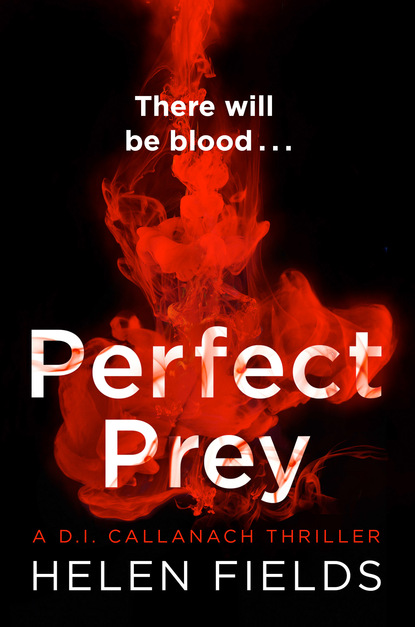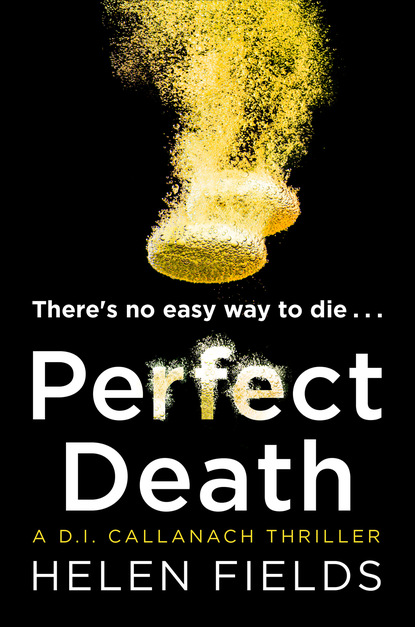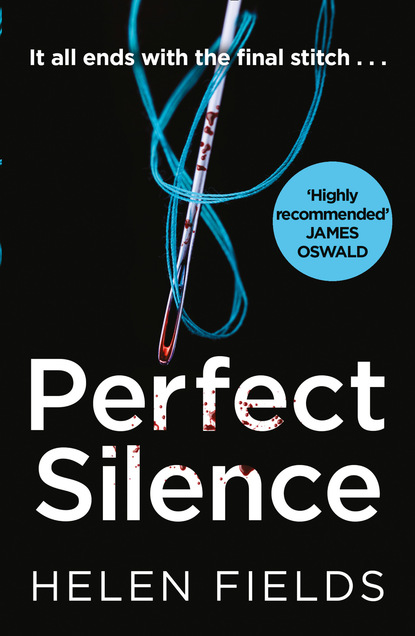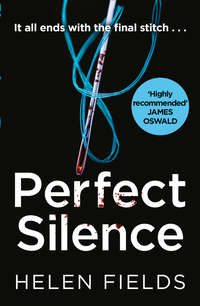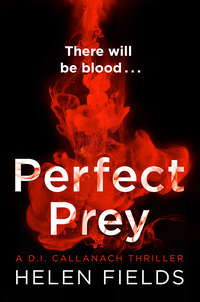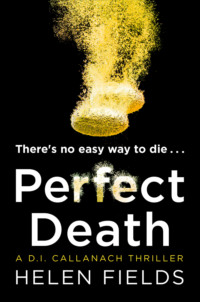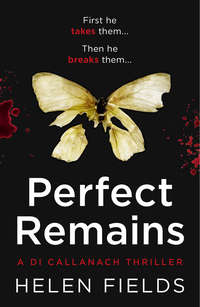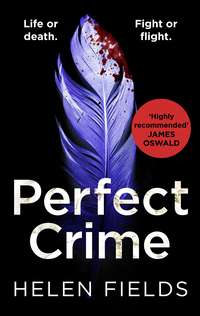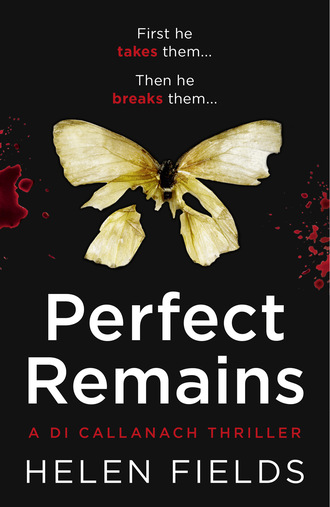
Полная версия
A DI Callanach Thriller
‘Who found it?’ he asked the driver.
‘A couple of hikers saw the flames from a distant peak but had to walk fifteen minutes before they got mobile reception to phone it in. By the time the fire service had located the bothy it was nearly burned out. Not much left to see, I’m afraid.’ Callanach took out a camera. He always took his own photos at crime scenes. Later, the images would cover his office wall.
The bothy, more refuge than accommodation, was a stone hut left unlocked for hikers caught in storms or mid trek, consisting of a single room, its rear wall set into the rock face. Callanach guessed the original building dated back a couple of hundred years. Now the roof was completely gone, fallen in once the fire had taken hold, making the forensic investigation painstaking. Even the huge stones of the wall base had shifted in the intense heat. Callanach surveyed the horizon. This wasn’t a place you could stumble across. Whoever had brought the woman here had chosen carefully, made sure it was nowhere near regular trekking routes, and had been inside before.
‘Where is the body?’ he asked.
‘They’ve collected the bones already, but their positions are marked inside,’ the driver told him.
‘Just bones? That’s all that remains?’
‘Afraid so. The soft tissue was completely incinerated. We’ve no precise idea how long the fire was burning but it was a matter of hours, for sure.’
They walked to the doorway of the hut, now ablaze with portable floodlights, and watched as two forensics officers trod gingerly through the dusty debris. It was a grim place to die. A hand on Callanach’s shoulder stopped his imagination from filling in the details.
‘DI Callanach? I’m Jonty Spurr, one of Aberdeenshire’s pathologists. Not much left here for you, I’m afraid.’
Callanach shook his head. ‘I was told you had located an item of clothing. How did that survive when everything else is ashes?’
‘It’s not a complete item, just a scrap of a scarf, but the pattern was sufficiently remarkable that one of the constables recognised it as the same as your missing person’s. It got trapped under a rock and the lack of oxygen protected it. It’s already on its way to the lab for DNA testing. Looks as if there’s some blood on it.’
Callanach frowned. ‘That’s all you’ve got? Surely there must be something more.’
‘These are the cards we were dealt, Detective Inspector. Fire is a crime scene’s worst enemy. The accelerant can usually be identified fairly quickly. Unfortunately, it’s a peat floor in this part of the Cairngorms which quite literally added more fuel to the flames. Without it, I’m sure it wouldn’t have burned so long or so hot. The bones are badly damaged.’
‘What about tyre marks? There must have been tracks.’
‘You’d hope so, but the fire trucks were called in first and tore up the ground. They had no idea what was inside. We’ll get the dogs out tomorrow and do a fine-comb check of the area but it’ll do no good tonight, not enough light left.’
Callanach took out his camera again and began collecting images of the grey and black charcoal mess of floor.
‘Did she die here?’
‘I can’t say for sure, and with only bones left I may not be able to pinpoint a cause of death, unless the skull gives me something. Many of the bones are broken, the jaw is in pieces. It seems to me though that this was about disposing of the body. Your murderer didn’t want anything left, was probably hoping she’d be unidentifiable,’ the pathologist remarked, pulling off rubber gloves and stretching his neck.
‘You believe she was killed elsewhere and transported here?’
‘You’re the detective. That part’s up to you. If you’re staying overnight, you can come to the morgue in the morning, see what we’ve got.’
‘I’ll be there,’ Callanach replied, looking around for Tripp. He found him stealing a sip of coffee from Sergeant Lively’s flask. ‘Tripp, interview the hikers, mark their precise position on a map and the time they first saw the fire. I want to hear their call to the emergency services and you’ll need to go to the spot where they were standing to photograph the view they had across to here,’
Sergeant Lively interrupted. ‘Statements will have been taken already so I don’t see what good that’ll do.’
The man’s too-long-in-the-job attitude was tiresome to deal with, but far from unusual. Callanach fought the desire to reprimand him and concentrated instead on the matters at hand.
‘The number of hours this fire was burning will help us determine the time the murderer left the scene. The height, and perhaps even the colour of the flames when the hikers saw them, might help establish that, enabling us to question local people about unusual vehicles within a specific time frame.’
‘You’re the boss,’ Lively mumbled, not bothering to hide his lack of respect.
‘Where are we staying tonight, sir?’ Tripp asked, stamping his feet and shoving his hands ever deeper in his pockets. For all his usual enthusiasm, Tripp looked distinctly uncomfortable in the great outdoors and the freezing cold.
‘Ask the local officers what’s around. There must be accommodation reasonably nearby. Tell Salter she’s to attend the morgue with me in the morning and I want Barnes at the scene until it’s completely documented. Feedback from each one of you, every two hours.’
‘What if that’s not Elaine Buxton? It’ll have been a complete waste of our time.’
Callanach glared at Lively. ‘Whoever’s corpse that is, Sergeant, they were almost certainly murdered and if we can contribute to the investigation then only an idiot would regard it as a waste. So unless you have something professional to contribute, from now on you can keep your personal opinions to yourself.’
Chapter Five
The landline rang. King studied the number before picking up. It was a local code.
‘Dr King,’ he snapped.
‘Hello, this is Sheila Klein from Human Resources. I’ve been asked to ring and see when we can expect you back. University policy is that we need a doctor’s note for medical leave beyond three consecutive days.’
Reginald King sighed. He hated the petty rules and regulations that tied him into his banal public existence. The woman on the phone couldn’t possibly comprehend that there were aspects of his life demanding more attention than his underpaid, under-appreciated and underwhelming job.
‘I’m aware of the terms of my employment contract.’
‘So, any idea when we might see you or have confirmation from your doctor?’ Sheila asked, her voice trailing off towards the end of the sentence.
King took a key from his pocket as she whined. ‘A few more days,’ he said. ‘Maybe a week. The virus has gone to my chest and set off my asthma.’
‘Gosh, that sounds awful. You know we have an open-door policy. Do call if you think you’ll need more leave. I’m sure the department head will be sympathetic.’
The Head of School in the Department of Philosophy would not be sympathetic, King thought. She would be as ignorant as ever, and the ignorant always failed to appreciate him. Just because he was an administrator rather than an academic, because his qualifications came from a university she chose not to recognise, because he hadn’t climbed the ranks through socialising and networking, she was not interested in him. Well, the Department of Philosophy could pay his wages while he had some time to himself. Professor Natasha Forge, the youngest Head of School of any department at the University of Edinburgh, would no doubt fail to even register his absence.
King unplugged the phone. Twelve steps down into the cellar he went, switching on the basement light and sliding a wooden panel in the wall to reveal a keyhole. Unlocking the hidden door and stepping inside, he rose twelve steps back up, parallel to the first staircase but concealed behind a layer of plaster, brick and sound proofing. At the back of his house was a secret space, windowless, silent, timeless. It was a place of beauty. He congratulated himself on how well he had designed it with pastel colours to soothe, with gently piped classical music, and art prints adorning the walls. Unless you surveyed the house inside and out, you would never know the back section existed. It was his island. He recited John Donne’s lines as he took a key to the last door. The great poet was right. He could not be entire, if alone. That was why he had gifted one fortunate person with the chance to accompany him on his journey. As he opened the door, the woman on the bed began to scream.
Elaine Buxton, recently presumed dead, the bones attributed to her corpse already laid out on an autopsy table, strands of DNA in code form swirling through cyber space so that her death could be formally recorded, cried out until her voice was hoarse.
‘Your gums are healing nicely,’ King said. He spoke softly to her. It was a point of pride that he didn’t lose his temper, no matter how much she screamed. Not so with the other woman. When he’d taken her, she’d scratched, bitten and kicked him so hard his groin had been agony for a week. She’d required no delicate handling. She had been beneath him.
‘Pleath, ’et me go,’ Elaine mouthed, the tears starting again. That irritated him, as he knew it would any man, but it was to be expected for a while. Until she learned to appreciate him.
‘In a week your mouth will have recovered enough to fit dentures, then we’ll commence speech therapy. It won’t be instantaneous but you’re a bright woman. You need another shot of antibiotics and more steroids. Please don’t fight me, I’m only trying to speed the healing process.’
Elaine began to shudder although the motion made no impact on the metal ankle and wrist cuffs with short chains, binding her to the bed. King took out two syringes. He was respectful when he touched her, would never cause unnecessary pain. She didn’t understand that yet, obviously believing that at any moment she might receive the same treatment as her decoy. It was a shame he’d had to kill the woman in front of Elaine, but it had all been part of the education process. She needed to know that he was capable of being strict. Every pupil had to be shown stick and offered carrot. Knowing that one’s teacher would not tolerate a failure to comply was an excellent motivator.
He stroked Elaine’s arm with his pale, silky hand. She shivered as their flesh made contact but did not tell him to stop. Perhaps, he thought, she was learning already. That was why he’d chosen her. Months of watching, waiting, consuming her days and nights from the shadows. Studying her. Real study with commitment, not the poor excuse for it that universities accepted these days, had borne fruit. She was perfect. Adaptable. Fast. No husband or children to distract her. He’d seen her pick up a set of legal papers at six in the evening and work all night, only caffeine for company, springing into court the following morning as if she’d slept ten hours. Then she’d go to the gym and work the tension from her body. There was no excess. She was driven, like him. Constantly improving.
That was why her choice of body double had been so ironic. King couldn’t have found a more dynamic opposite. All he’d needed was a woman of roughly the same age, height and build. The fact that she was a prostitute, stick thin (presumably from years of drug abuse) and barely able to string together a coherent sentence, had made it all the easier to dispose of her. He could have been kinder, but she wouldn’t listen when he’d tried to explain the service she was performing, giving him a life partner who was his perfect match.
He’d never even learned her name. As it was, she would forever be the missing Elaine Buxton. And Elaine Buxton, erased from the living world, belonged wholly and exclusively to him.
‘I could rename you,’ he said. ‘It might be an important part of the adjustment process. Compile a shortlist in your head of say three or four. You can explain why you selected each of them, then I shall choose the one I find the most pleasing. It’ll be a good way for us to move forward together.’
‘You’re crathy,’ she whispered as he withdrew the needle from her arm.
‘You shouldn’t use such base terms. But you’re upset and I’ll be lenient for a while.’
‘Wha’ ’id you do with the girl?’
‘You needn’t worry about her. At the end, her sacrifice made up for her wasted life.’
Elaine was staring at the area where he’d carefully laid out a vast sheet of plastic for the girl’s body. King had used an old car, hired from a sufficiently disreputable dealership that wouldn’t want any contact with the police, and kept it in a garage away from his home. One night he’d driven to Glasgow, picked up the girl who was soliciting in her usual spot (he’d been there several times to select the right one) and driven round a few streets to find a quiet place for her to earn her money. He’d found that concept amusing, even as he’d pressed the chloroform-soaked rag over her face. Earning money. That was all young women thought they had to do for a few pounds these days, believing that men existed to pay for them, that they simply had to don a short skirt and paint their mouths red. It was pitiful. And she’d wanted to charge him thirty pounds to put her filthy tongue inside his trousers. He was ridding the world of a scourge. He may well have stopped the spread of a dreadful disease by bundling her unconscious body under a tarpaulin and driving her away from her next customer.
It had taken immense physical effort to cart her into the hidden room. Down one set of stairs and up another had seemed like a genius plan when he’d conceived it. The reality was more cumbersome. Several times he’d banged her head hard on the steps, not that it mattered. He’d kept her body wrapped in plastic, but allowed her to breathe. Asphyxiation wasn’t the plan.
Elaine hadn’t liked it when he’d brought the girl in. Perhaps the tiniest hint of jealousy behind the melodramatic hyperventilation and wide-eyed head shaking, he’d thought. How could she ever have believed he would bring such a filthy, low creature into their lives?
King had returned the woman to consciousness long enough to obtain details of past fractures. Previous injuries could tell tales. The thickening of bones long after they’d healed could reveal an unhelpful story, even if all the DNA had been destroyed. She’d been remarkably forthcoming. He’d just had to promise he’d let her live if she provided the information he wanted.
In the event, there wasn’t much to be concerned about. A finger broken in a car door and a dislocated shoulder that wouldn’t show up. By far the more important thing was to ensure that the girl’s left upper arm was fragmented where Elaine’s had been fractured after she came off a bicycle as a teenager. If that bone was left intact and the pathologist was thorough, then all of King’s hard work would have been for nothing.
Once he had all he needed, King had told Elaine to watch and not look away. When he’d put on the protective glasses the prostitute had only looked curious. When he’d snapped on rubber gloves and a face mask she’d begun to plead. Elaine, for once, had grown silent. When he’d picked up the baseball bat, well, that was a different story. He had no memory of Elaine’s reaction for those few minutes. He’d experienced what he assumed was tunnel vision, for the first time in his life. It had been a breathtaking episode. Everything but the screaming, whimpering, dribbling, blubbering pile of living flesh before him had faded out. There had been no peripheral vision to distract him. He couldn’t hear anything beyond her feral cries. It was the most intensely concentrated sensation he had ever felt.
He’d awoken, and it was an awakening, standing before her, bat clutched in his hands, to find his pulse racing as if he’d run a marathon. It had been quite the adrenaline rush. For a while there was silence, then gradually Elaine’s intermittent sob-screams had broken through. The girl’s face was a mess, as he’d intended. He’d needed to bash every one of her teeth out of their sockets and damage the jaw beyond x-ray comparison for the identity exchange to work. He hadn’t foreseen that he’d get so carried away, he felt rising shame at the guilty pleasure he’d taken, seeing his handiwork in the bruises on her neck and breasts, guessing there were marks on her stomach and legs too, but unwilling to lift her undoubtedly infested clothing to see. He’d lost control – nothing to be proud of – but didn’t he deserve to vent? Better to let it out with her than Elaine. He had no desire to diminish his prize.
King shook himself out of the memory and stared at the woman whose identity the prostitute had taken in death.
‘How are we doing with those tapes? I’m sure you’ve been glad to have an activity to occupy you. I know you already speak French so I thought Russian might be a more exciting challenge. When you’re talking properly again, I’ll test you and we can make some real progress.’
He flicked a switch on the sound system and a voice began speaking words that Elaine had no inclination to listen to, or repeat. With a baby-soft kiss on her forehead, King placed a protein drink at her side and left.
Chapter Six
The autopsy table looked more comfortable than the bed he’d slept in. That was before it was occupied by the remnants of what was presumed to be Elaine Buxton’s skeleton. It had been a bad night. Callanach would have self-medicated with a decent bottle of red, but the only wine on offer had a label with all the appeal of a bargain-bucket binge drinker’s delight. Braemar was a slightly touristy but pleasant village lacking much choice in accommodation and the better options had been fully booked. In the absence of good wine, he’d settled for a dilapidated TV with crackling reception, soup he’d admired only because he’d previously thought it impossible to cook it so badly, and half decent coffee.
Jonty Spurr, the pathologist, was quiet as he worked. Callanach appreciated that. He’d witnessed too many autopsies to be disturbed by the body. What he found more disquieting was the forced cheer some pathologists had about them. Too talkative, too determined to lift the atmosphere. Spurr was slow, not annoyingly so, but unhurried and probably unflappable under even the worst pressure.
‘The victim was an adult female, aged between thirty and forty, I’d say, approximately five foot six.’
Callanach glanced at DC Salter. She was young but not new to the job and showed no sign of being troubled by what she saw.
‘Has the accelerant been identified yet?’ she asked.
‘We’ll need to do more tests on the bones for that. The fire department might have picked something up at the scene.’ Spurr chose a bone fragment and held it up for Callanach to inspect more closely. ‘The heat and length of time the fire was burning destroyed any chance of getting DNA from the bone marrow. The skull, jaw and upper chest sustained damage not caused by the fire. You can see a pattern of fractures indicating repeated use of a heavy, blunt weapon. Must have taken quite some force.’
‘Was that the cause of death?’ Callanach asked.
‘I’d put my money on those injuries occurring before death. The resulting trauma to the brain may well have been what killed her. With no soft tissue left, I’m not going to do much better than that. Given the planning put into disposing of the body, there’d have been no other practical reason to disfigure the face after death.’
‘Bastard,’ Salter said.
‘Indeed,’ Spurr replied. ‘We’re cross-checking the teeth against Elaine Buxton’s dental records. Some have fillings or caps, so it should be easy enough.’
‘How soon will we have that?’ Callanach was keen to leave. Morgues made him claustrophobic in spite of the bright light and fierce air conditioning. It felt like a prison cell and he’d had enough of those.
‘Maybe as early as tomorrow. Will you still be here?’
Callanach wasn’t even going to consider another night in the same accommodation.
‘No, in Edinburgh. We’re going back to the crime scene to get a daylight view then we’ll set off. You’ll call when you have more information?’
Spurr nodded, stripped off a glove and offered Callanach a hand. He disliked the dry, powdery feel of it against his own, as if death was contagious.
‘Is there any news from the crime scene this morning?’ he asked Salter once they were on the road.
‘No. I tried to speak to DC Tripp but mobile reception was poor. He and DS Lively were off to speak with the hikers first thing, but they should be back at the crime scene by the time we get there.’
‘She wasn’t murdered there,’ Callanach said.
‘Surely it’s hard to tell at this stage,’ the young constable commented quietly.
‘Why bother taking her so far to kill her? It makes no sense. It may be the perfect site to dispose of a body, but it’s not a comfortable or convenient place for playing out his fantasy about her death. A great deal of time passed between her disappearance and the corpse turning up, time the murderer spent elsewhere with the victim. Whoever abducted her had this place in mind for weeks, if not months.’
An hour later the bothy was back in sight. Forensic investigators were shouting to one another, the excitement plain on their faces. Callanach was out of the car before Salter could put on the hand brake.
‘What’s happening?’ he asked a passing officer.
‘The dogs tracked a weapon some distance away, buried under a pile of stones.’ Callanach watched the back slapping among the handlers.
There would be no fingerprints, he thought. A man who found such a perfect place to destroy a body didn’t leave prints.
‘Good news, right, sir?’ came Tripp’s voice from behind him.
‘Tell me what you’ve got,’ Callanach replied. Tripp wiped the smile off his face and looked down at his notebook.
‘The hikers repeated what they’d said in their statements. Oliver Deacon and Tom Shelley, both in their early twenties, had been hiking for about three hours, reached the midway point in their route and saw the blaze from’ – he looked around, identified a peak and pointed into the distance – ‘over there. They had binoculars and took photos with their phones, not that they show anything except a distant orange dot. I’ve drawn a map of their route.’
Callanach nodded. ‘We’ll head back to Edinburgh tonight,’ he said. ‘If I authorise any more overtime, I’ll have no job to get back to.’
Two hours later, they were fighting the city traffic.
‘Something wrong, sir?’ Tripp ventured after dropping Salter home.
‘I think so,’ Callanach replied. ‘I just don’t know what yet.’
‘We’ll be taking over the case, will we, if it proves to be Elaine Buxton’s body?’
‘As soon as I’ve cleared it with the Detective Chief Inspector. Take me straight to the station.’
The Major Investigations Team offices were all but deserted. Callanach liked being alone. He could concentrate, undisturbed by slamming doors, the hiss and gurgle of drinks machines and the constant undertone of voices. Quiet was uncomplicated. And it delayed returning to his flat. Somehow the act of unlocking that door would make his transition to working and living in Scotland real. He longed for France, for the culture that ran in his blood. Having one Scottish parent and being fluent in the language was no substitute for the country that had been his home for all but the first four years of his life. Even the cloud under which he’d left hadn’t tainted his memories of Lyon.
He opened a box and began dumping the contents into drawers.
‘So was your trip to the Cairngorms worth the bollocking it’s going to get you?’ came a voice from the doorway. Startled, he dropped a file, getting a laugh from his fellow detective inspector. ‘Sorry, I hadn’t meant to scare you. Apparently Interpol agents are easily caught unawares.’
Callanach retrieved the file from the floor, frowning as he reordered the paperwork.
‘DI Turner, I’d assumed I was alone.’ He checked his watch. ‘It’s nearly one in the morning.’
‘I practise my best paperwork avoidance at night. No one here to chase me for it. That and the fact that I’ve done so many night shifts, my brain has long since ceased to differentiate between dark and light,’ she said. ‘What’s your excuse?’


